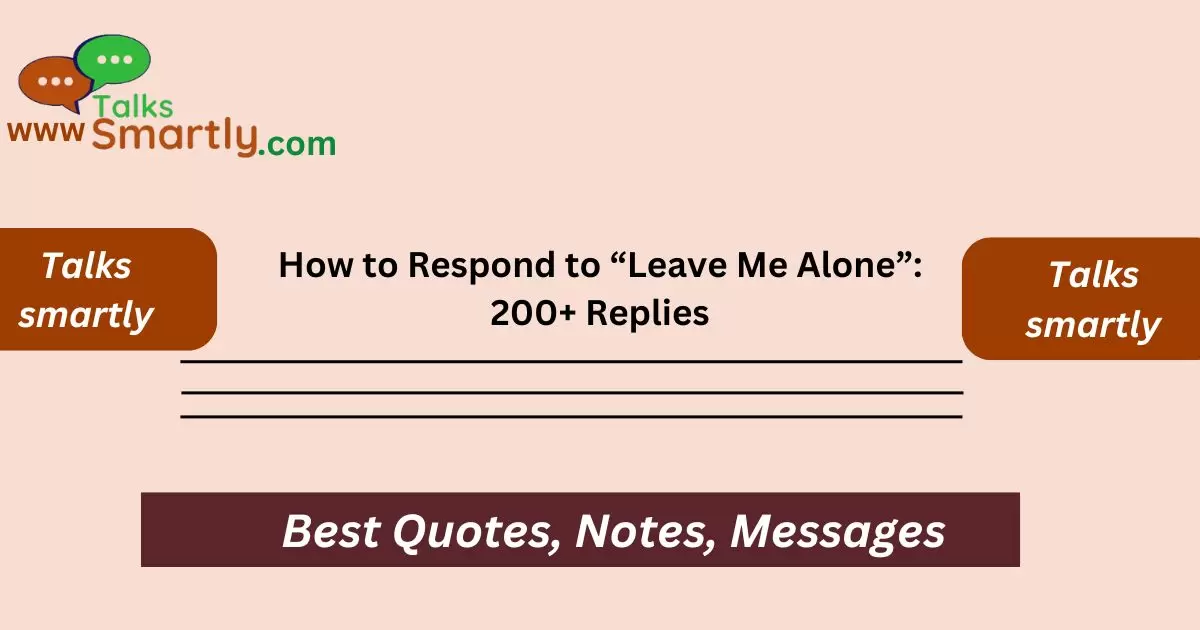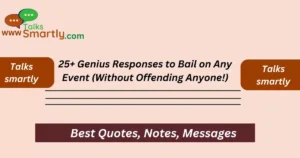“Navigating a response to “leave me alone” requires sensitivity and tact. Whether the request is made in personal or professional contexts.”
When someone tells you to “leave me alone,” it can be a challenging moment. Responding appropriately is crucial to ensure that you respect their wishes while preserving the relationship. The right reply helps avoid further conflict and shows that you respect their need for space.
Understanding how to respond thoughtfully is key to managing such situations with grace. By acknowledging their request without escalating the situation, you demonstrate empathy and maintain professionalism.
Handling this request properly not only resolves the immediate interaction but also contributes to healthier long-term relationships. Having a variety of respectful responses can help you navigate these conversations more effectively.
Key Strategies for Responding to “Leave Me Alone”
Acknowledge Their Request
Acknowledging their request is important to show that you understand their need for space:
- Respect their space: “I understand you need some time alone. I’ll respect that.”
- Validate their feelings: “It seems like you’re feeling overwhelmed. I’ll give you the space you need.”
- Avoid taking it personally: “I get that this isn’t about me. I’ll step back now.”
Acknowledging their request helps prevent further escalation and shows that you are considerate of their feelings.
Keep Your Response Brief
A brief response helps to respect their request without prolonging the interaction:
- Be concise: “Got it. I’ll leave you alone.”
- Avoid over-explaining: “Understood. I won’t disturb you.”
- Minimize engagement: “Noted. I’ll step back now.”
Keeping your response short and to the point helps in respecting their desire for solitude.
Express Understanding

Showing understanding in your response demonstrates empathy and acknowledgment:
- Show empathy: “I understand you need some time to yourself. I’m here if you need anything later.”
- Acknowledge their emotions: “I can see you’re frustrated. It’s okay to take a break.”
- Offer to talk later: “Whenever you’re ready, I’m available to talk.”
Playful Comebacks to ‘Come Over’: Top Responses to Keep the Conversation Fun
Offer Support Without Pressuring
Offering support without pressuring them respects their boundaries:
- Indicate availability: “I’m here if you need someone to talk to later.”
- Avoid insisting: “I won’t push for a conversation right now. Just know I’m available.”
- Be supportive: “Feel free to reach out when you’re ready. I’m here to help if needed.”
Stay Calm and Professional
Maintaining a calm and professional demeanor is essential:
- Maintain composure: “I understand. I’ll give you the space you need.”
- Avoid anger or frustration: “No problem, I’ll step back now.”
- Stay polite: “Thank you for letting me know. I’ll respect your wishes.”
Use Neutral Language
Neutral language prevents further escalation and keeps the conversation straightforward:
- Avoid emotive language: “Got it. I won’t disturb you.”
- Be factual: “Understood. I’ll give you space.”
- Keep it respectful: “I’ll respect your request for solitude.”
Reflect on Their Perspective
Considering their perspective helps in understanding their request better:
- Understand their position: “It seems like you need some space. I respect that.”
- Acknowledge their boundaries: “I appreciate you letting me know. I’ll honor your need for solitude.”
Offer a Simple Response
A straightforward response is often effective:
- Use a simple acknowledgment: “Got it. I’ll leave you alone.”
- Avoid complex explanations: “Understood. I won’t reach out further.”
Respect Their Need for Privacy
Respecting their privacy helps in maintaining boundaries:
- Avoid probing questions: “I respect your privacy and won’t ask for details.”
- Honor their request: “I’ll give you the privacy you need.”
Avoid Repeated Requests
Repeated attempts to contact someone who has asked for space can escalate the situation:
- Do not persist: “I won’t reach out again as requested.”
- Respect their initial request: “I’ll honor your need for solitude without further contact.”
Follow Up Thoughtfully

If appropriate, follow up in a respectful manner:
- Check in later: “Just checking in to see if you’re open to talking now.”
- Respect their response: “I understand if you’re still not ready to talk.”
Avoid Misinterpretations
- Be direct: “I understand and will give you the space you need.”
- Clarify intentions: “If you need anything later, I’m here. I’ll respect your request now.”
Answer to key Question
1. How should I respond if someone says “leave me alone” during a heated argument?
Acknowledge their request and give them space. “I understand you need space right now. Let’s talk later when things have calmed down.”
2. What if I feel their request to leave them alone is unreasonable?
Even if you think it’s unreasonable, respect their request. “I see you need some time alone. I’ll step back for now.”
3. Can I contact them again after they’ve asked me to leave them alone?
Yes, but only after some time has passed and if you believe it’s appropriate. “I’m checking in to see if you’re ready to talk now.”
4. How can I make sure my response doesn’t escalate the situation?
Keep your response calm and neutral. Avoid emotional or confrontational language. “I’ll respect your request for solitude and give you space.”
5. What should I do if I need to communicate something urgent after they’ve asked for space?
Send a brief and respectful message about the urgency. “I have something important to discuss. Please let me know when you’re ready to talk.”
Conclusion
Responding to “leave me alone” with empathy and respect is essential for maintaining healthy relationships. By acknowledging their request, staying calm, and using thoughtful responses, you can navigate these situations effectively.
Handling such requests with care not only addresses the immediate need but also contributes to better communication and understanding in the long run. Having a variety of respectful responses helps in managing these conversations with dignity and respect.











